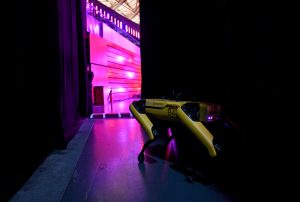SoftBank is planning on selling robotics firm Boston Dynamics to South Korean automobile giant Hyundai Motor, Bloomberg reported on November 9. “Proposed terms of the deal would give the South Korean automaker control of the robotics company in a transaction valued at as much as $1 billion,” a source familiar with the discussions told the outlet. The firm, which will have changed hands twice since its acquisition by Google in 2013, if the deal with Hyundai goes through, has reportedly not made any profit so far. In 2017, Alphabet – Google’s parent company – had sold Boston Dynamics to Japan’s SoftBank. The twists and turns in the firm’s trajectory also highlight the inherent difficulties in making mobile all-terrain robots a commercially viable proposition, including selling them for military use.
In many ways, Boston Dynamics’ four-legged robots have come to represent the promises and perils of robots that can explore their own environment in the popular imagination, even when they are remotely controlled and, therefore, are not truly autonomous. Every time a firm’s robot has debuted, the internet has exploded in a mix of awe and snark about the coming era of robot overlords. Earlier this year, in May, a video clip that made the rounds on social media showed a Boston Dynamics robotic dog, Spot, in a Singapore park relaying COVID-19 related guidelines. The robotic dog has on-board cameras that allow it to perform surveillance and inspection tasks. Picking up the Singapore news, comedian Stephen Colbert compared Spot’s stroll with scenes from the Netflix show “Black Mirror.”
In September this year, Boston Dynamics had announced that Spot – after commercial trials through an Early Adopter program – is now available for commercial and industrial purchase in the United States, United Kingdom, European Union, and Canada. While noting that “Boston Dynamics prohibits sales of the robot to countries that are subject to ITAR [International Traffic in Arms Regulations] or Export Control restriction by the United States,” the company press release making the announcement also added that “Spot will continue to be available for lease to customers in other international markets through the Early Adopter Program.” A publicist representing the company told The Diplomat that the Spot spotted in Singapore was also through that program. (The September press release seemed to suggest that the Early Adopter Program was limited to Europe and North America.)
However, given Spot’s invasive surveillance potential, the company may find it hard to expand its global market, especially in Asia, considering the new September 30 voluntary guidelines from the U.S. State Department for exporters of surveillance capabilities. The guidelines, which go beyond mandatory export control directives, emphasized the need for exporters to consider human rights situations in the target countries, including paying close attention to any curbs on civil society activities. (Singapore, as an example, continues to be of significant concern when it comes to human rights.)
Reports suggest that Spot has been deployed by BP in an offshore oil rig in the Gulf of Mexico, as well as by the Norwegian oil and gas firm Aker BP on a rig in the Norwegian Sea. A news report notes that 75 companies have rented Spot since September last year when it became commercially available, including by the Massachusetts State Police bomb squad.
Founded in 1992 as a spin out from MIT’s Leg Lab, Boston Dynamics initially focused on robots for the U.S. military, with funding from the Defense Advanced Research Projects Agency. However, by 2015, the U.S. Marines had passed over BigDog, Spot’s older, bigger, meaner version which was meant to have worked as load bearer for the force. Explaining the decision, U.S. Marine Warfighting Lab spokesperson Kyle Olson told Military.com in December 2015: “As Marines were using it, there was the challenge of seeing the potential possibility because of the limitations of the robot itself.” He added, “They took it as it was: a loud robot that’s going to give away their position.”
Other than Spot, Boston Dynamics’ offering include three other robots: Handle, Atlas, and Pick.

































